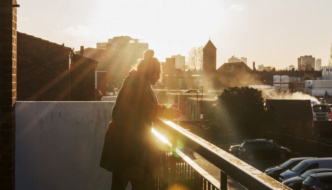The Art of Humanising – Invisible Manchester’s City Tour in the Footsteps of the Homeless
April 2, 2019
Manchester had the highest number of homeless deaths of any local authority in the country in 2017. Yet this news, from last month, will have shocked few who live here.
When it comes to homelessness in Manchester, nothing has been labelled as a crisis so often, with so little being done about it. From those knocked unconscious by a new strain of Spice, to those passing by blindly, to authorities brushing them from place to place; the city is numb to what should be a shocking scene. New, unique initiatives are needed to draw attention back to the issue burning before our eyes.
Invisible Cities, who train people affected by homelessness into becoming city tour guides, could well be returning our attention to the flames. The Manchester branch was formed a year ago by Alice Sparks, a young woman inspired to make tracks in her own location following an Invisible City tour attended in Edinburgh. Manchester tours are led by the affable Danny Collins, a man who spent four years on the streets. The experience they’ve arranged, taking form in his ‘Off the Cobbles’ tour, is a touching insight into the realities faced by people like Danny. It both challenges and inspires its attendees.
I join a tour one weekend in March under the grimmest conditions Manchester can offer. Attendees assemble by the cenotaph, where we are introduced to the most memorable guide anyone in our group will likely ever meet.
Danny, with vivid eyes and a Scouse accent, introduces himself as our shepherd for the day, before offering the first of many facts and anecdotes that are unsettling in their sadness. One in five homeless people in Britain are ex-servicemen, we’re told. Danny falls into this category, and is frank about his understanding of the reasons, which he describes alongside a chink of insight into how it feels to be habituating the streets of a country he could have given his life for.
He performs his very own poem, titled ‘PTSD’, a straightforward, sombre verse that lays such feelings out in a lyrical style distinctly his. It is confrontationally bleak (“The doctor says it’s PTSD / But I know there’s no cure for me”), but anything less might feel disingenuous.
With that, we traffic on to the next city spot that has been paired with one of Danny’s poems. Each place has meaning for Danny and will not traditionally be a stand-out site for those travelling around Manchester. At each stop, he pays tribute to those who’ve lost lives on the streets – 600 recorded in 2018 – and faces his audience with the truth about homelessness, while unlocking unseen locations across the city that most don’t take the opportunity to appreciate.
As a guide and a creative, Danny makes bridges between tourist and homeless, city and citizen, his own past and present situations. He evokes sympathy through the immense expression harnessed in his poems. His words aren’t shy of the emotional reality of living rough; they reinforce the stats he shares by offering the author as evidence.
There are lines that strike right to the heart of homelessness with astute understatement:
What makes you well is seeking help, what stops you is not knowing how to ask
…
Someone asked ‘Don’t you want to get back to where you were?’, I said ‘No’, said ‘That’s what put me here’.
Danny’s wisdom alone is worth the ticket cost, which is why tour proceeds are going towards getting his poems published and available to buy in the near future.
Danny’s hard-hitting retelling of events is softened by his unscathed wit. This is helped by how striking some of the sites are. Stops include a Catholic church known as the ‘Hidden Gem’, the Manchester Cathedral, and spots in the Northern Quarter. In particular, a bench outside St Anne’s Church with a sculpture of ‘Homeless Jesus’ wrapped in blanket, bare feet bearing the stigmata, is powerfully serene.
We visit one location that Danny used to sleep by. It has since been fortified with bike lock stands to prevent more homeless people from sleeping there. He shares a story of schoolchildren painting the wall then inviting him to add to the design. The pink cartoon worm he added is hidden behind a bike, invisible for now. However, it is comforting to know the painting will remain, sustaining its own veiled legacy. In many ways, it evokes Danny. There may well have been times when he perceived himself as invisible. But he’s laying down an indelible legacy today, as a distinct artist, a shrewd activist and one of the nicest people you’ll ever meet.
Danny’s tour has succeeded in many ways. It has taught attendees the hard truth about homelessness, provided someone once homeless with enterprise, been a space for artistic performance, and has given insight to a city, like all guided tours should. The tour succeeds, above all else, because of Danny’s autonomy. Alice Sparks has given her guide creative control that makes the experience coherent and honest and should make Danny immensely proud of himself.
It’s not easy managing to combat the stigma around homelessness while empowering its victims, let alone making a space where city discovery and creative expression can take place. Invisible Manchester paints Manchester and its homeless inhabitants in a different, compassionate light. It has mastered the art of humanising.
Will Baldwin-Pask
Filed under: Tour, Uncategorized
Tagged with: Alice Sparks, city tours, Danny Collins, homeless, homelessness, manchester, poetry, PTSD



Comments